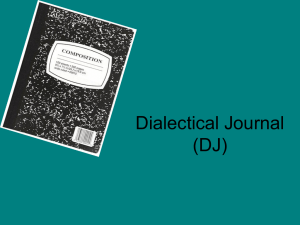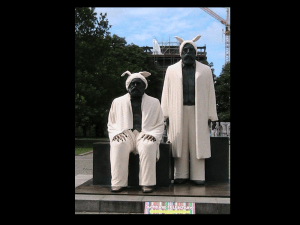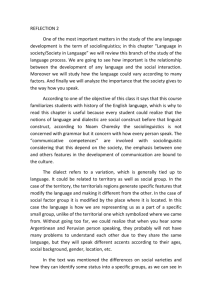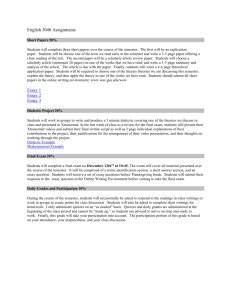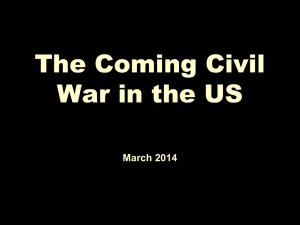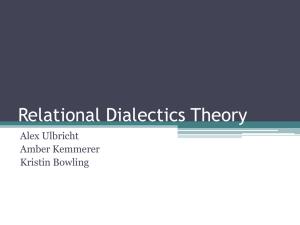Dialectic
advertisement
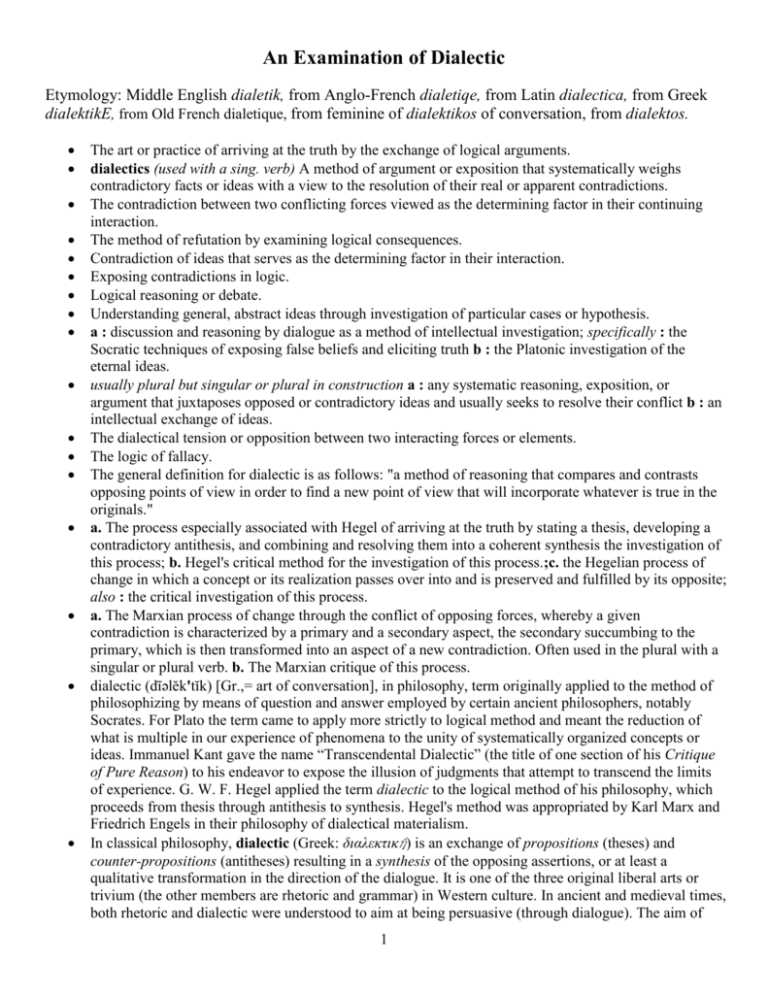
An Examination of Dialectic Etymology: Middle English dialetik, from Anglo-French dialetiqe, from Latin dialectica, from Greek dialektikE, from Old French dialetique, from feminine of dialektikos of conversation, from dialektos. The art or practice of arriving at the truth by the exchange of logical arguments. dialectics (used with a sing. verb) A method of argument or exposition that systematically weighs contradictory facts or ideas with a view to the resolution of their real or apparent contradictions. The contradiction between two conflicting forces viewed as the determining factor in their continuing interaction. The method of refutation by examining logical consequences. Contradiction of ideas that serves as the determining factor in their interaction. Exposing contradictions in logic. Logical reasoning or debate. Understanding general, abstract ideas through investigation of particular cases or hypothesis. a : discussion and reasoning by dialogue as a method of intellectual investigation; specifically : the Socratic techniques of exposing false beliefs and eliciting truth b : the Platonic investigation of the eternal ideas. usually plural but singular or plural in construction a : any systematic reasoning, exposition, or argument that juxtaposes opposed or contradictory ideas and usually seeks to resolve their conflict b : an intellectual exchange of ideas. The dialectical tension or opposition between two interacting forces or elements. The logic of fallacy. The general definition for dialectic is as follows: "a method of reasoning that compares and contrasts opposing points of view in order to find a new point of view that will incorporate whatever is true in the originals." a. The process especially associated with Hegel of arriving at the truth by stating a thesis, developing a contradictory antithesis, and combining and resolving them into a coherent synthesis the investigation of this process; b. Hegel's critical method for the investigation of this process.;c. the Hegelian process of change in which a concept or its realization passes over into and is preserved and fulfilled by its opposite; also : the critical investigation of this process. a. The Marxian process of change through the conflict of opposing forces, whereby a given contradiction is characterized by a primary and a secondary aspect, the secondary succumbing to the primary, which is then transformed into an aspect of a new contradiction. Often used in the plural with a singular or plural verb. b. The Marxian critique of this process. dialectic (dīəlĕk'tĭk) [Gr.,= art of conversation], in philosophy, term originally applied to the method of philosophizing by means of question and answer employed by certain ancient philosophers, notably Socrates. For Plato the term came to apply more strictly to logical method and meant the reduction of what is multiple in our experience of phenomena to the unity of systematically organized concepts or ideas. Immanuel Kant gave the name “Transcendental Dialectic” (the title of one section of his Critique of Pure Reason) to his endeavor to expose the illusion of judgments that attempt to transcend the limits of experience. G. W. F. Hegel applied the term dialectic to the logical method of his philosophy, which proceeds from thesis through antithesis to synthesis. Hegel's method was appropriated by Karl Marx and Friedrich Engels in their philosophy of dialectical materialism. In classical philosophy, dialectic (Greek: διαλεκτική) is an exchange of propositions (theses) and counter-propositions (antitheses) resulting in a synthesis of the opposing assertions, or at least a qualitative transformation in the direction of the dialogue. It is one of the three original liberal arts or trivium (the other members are rhetoric and grammar) in Western culture. In ancient and medieval times, both rhetoric and dialectic were understood to aim at being persuasive (through dialogue). The aim of 1 the dialectical method, often known as dialectic or dialectics, is to try to resolve the disagreement through rational discussion. One way — the Socratic method — is to show that a given hypothesis (with other admissions) leads to a contradiction; thus, forcing the withdrawal of the hypothesis as a candidate for truth. Another way of trying to resolve a disagreement is by denying some presupposition of the contending thesis and antithesis; thereby moving to a third (syn)thesis."The history of the term dialectic would by itself constitute a considerable history of philosophy" (Barbara Cassin, ed., Vocabulaire européen des philosophies [Paris: Le Robert & Seuil, 2004], p. 306, trans. M.K. Jensen). Briefly, the term "dialectic" owes much of its prestige to its role in the philosophy of Socrates and Plato, where it figures as the logical method of philosophy in the Socratic dialectical method of cross-examination. The term was given new life by Hegel, whose dialectically dynamic model of nature and of history made it, as it were, a fundamental aspect of the nature of reality (instead of regarding the contradictions into which dialectics leads as a sign of the sterility of the dialectical method, as Kant tended to do in his Critique of Pure Reason). In the mid-nineteenth century, the concept of "dialectic" was appropriated by Marx (see, for example, Das Kapital, published in 1867) and Engels and retooled in a non-idealist manner, becoming a crucial notion in their philosophy of dialectical materialism. Thus this concept came, for a time, to play a prominent role on the world stage and in world history. Today, "dialectics" can also refer to an understanding of how we can or should perceive the world (epistemology), an assertion of the interconnected, contradictory, and dynamic nature of the world outside our perception of it (ontology), or a method of presentation of ideas or conclusions. Also you could look at these sides as Apollonian and Dionysian. Presocratic Dialectic Heraclitus lived in the then flourishing Ionian Greek city of Ephesus, located on the western coast of presentday Turkey. The era during which he lived has been called the Shower of Stars by Will Durant and the center of the Axial Age by Karl Jaspers. Heraclitus flourished around 500 B.C., when the Buddha, Lao Tzu, Confucius, and Zarathustra were also alive and teaching in the East. The complete text of Heraclitus' book has been lost; however, since he was frequently quoted by other ancient philosophers, there are about 130 fragments of writing attributed to him. Unfortunately, more than one-half of these fragments have been challenged as to their authenticity by various scholars at various times. 1. The Theory of Flux: Fragment DK22b12 (K&R 214): New and different waters flow around those who step into the same river. The river disperses and comes together … flows in and out … towards us and away. Fragment DK22b91: You cannot step twice into the same stream; for fresh waters are ever flowing in upon you. Fragment from Plato’s Cratylus 402a (K&R 215): Socrates: Heraclitus somewhere says that all things are in process and nothing stays still, and likening existing things to the stream of a river he says that you would not step twice into the same river. 2. The Theory of Opposites: Fragment DK22b8: What opposes unites, and the finest attunement stems from things bearing in opposite directions, and all things come about by strife. Fragment DK22b10: Graspings: things whole and not whole, what is drawn together and what is drawn asunder, the harmonious and the discordant. The one is made up of all things, and all things issue from the one. Fragment DK22b51 (K&R 209): They do not apprehend how being at variance it agrees with itself [literally: how being brought apart it is brought together with itself]. There is a back-stretched harmony, as in the bow and the lyre. Fragment DK22b53 (K&R 212): War is the father of all and king of all; and some he shows as gods, others as men, some he makes slaves, others free. Fragment DK22b60 (K&R 200): The path up and down is one and the same. Fragment DK22b80 (K&R 211): It is necessary to know that war is common and right is strife and that all things happen by strife and necessity. 2 I think that one of the most important things to note about Heraclitus' Theory of Opposites is that it is a major influence in the development of the Hegelian Dialectic. Hegel, in one of his lectures (first given at Jena in 1805) on the History of Philosophy, tells us that: ... Heraclitus at least understands the absolute as just this process of the dialectic. The dialectic is thus threefold: (a) The external dialectic, a reasoning which goes over and over again without ever reaching the soul of the thing; (b) Immanent dialectic of the object, but falling within the contemplation of the subject; (c) The objectivity of Heraclitus which takes the dialectic itself as principle. The advance requisite and made by Heraclitus is the progression from Being as the first immediate thought, to the category of Becoming as the second. This is the first concrete, the Absolute, as in it the unity of opposites. Thus with Heraclitus the philosophic Idea is to be met with in its speculative form; the reasoning of Parmenides and Zeno is abstract understanding. Heraclitus was thus universally esteemed a deep philosopher and even was decried as such. Here we see land; there is no proposition of Heraclitus which I have not adopted in my Logic. Zeno of Elea wrote his famous paradoxes in the fifth century BCE. He was recognized later by Aristotle for using dialectic reasoning in his arguments. Specifically, his paradox involving Achilles and the tortoise demonstrates a law of formal logic known as modus tollens . However, Zeno only set the stage for later philosophers, primarily Aristotle, and did not define or set new laws in argumentation. Socratic and Platonic Dialectic Plato was a Greek philosopher and educator (of Aristotle) who was recognized most for the dialogues that he wrote. His form of dialectic was a process of division where the issue begins as a general one and is divided until it is less general, meaning that it could not possibly be divided again. To Plato, "dialectic" was a process applicable to both speech and thought. The term "dialectic" was used by Socrates as "the art of discussion" by which he searched for truth through questioning and answering. He looked down upon the Sophist's form of argumentation known as "eristic" and was derived from dialectic. Eristic discussions were an entertaining interactions in which illogical explanations and misleading statements were told. Although Socrates always searched for truth, he also worked hard to win the arguments. In Plato's dialogues and other Socratic dialogues, Socrates attempts to examine first principles or premises by which we all reason and argue with. Socrates typically argues by cross-examining someone's claims and premises in order to draw out a contradiction or inconsistency among them. For example, in the Euthyphro, Socrates asks Euthyphro to provide a definition of piety. Euthyphro replies that the pious is that which is loved by the gods. But, Socrates also has Euthyphro agreeing that the gods are quarrelsome and their quarrels, like human quarrels, concern objects of love or hatred. Therefore, Socrates reasons, at least one thing exists which certain gods love but other gods hate. Again, Euthyphro agrees. Socrates concludes that if Euthyphro's definition of piety is acceptable, then there must exist at least one thing which is both pious and impious (as it is both loved and hated by the gods) — which, Euthyphro admits, is absurd. Thus, Euthyphro is brought to a realization by this dialectical method that his definition of piety is not sufficiently elaborate, thus wrong. Aristotelian Dialectic Aristotle began his investigations with dialectic while still attending Plato's academy where he studied from 367 BCE through 347. Later he wrote Topics to serve as a handbook for dialectic argumentation. Aristotle used many forms of formal logic, and even calculus to further his points. Although this might not originally be considered dialectic, he claimed that it was stating that his logic developed as a result of reflecting on Plato's method of division. According to Aristotle, there were numerous benefits to the use of dialectic including: the intellectual training, its use for discussions with others based on their own premises, and for examining unprovable principles in science. 3 Stoical and Medieval Dialectic The Stoic's definition of dialectic was "formal logic". The term "dialectic" was used because the philosopher of the time period were interested in Zeno's Paradoxes and related reasoning. They believed that the dialectic process happened in two different ways: meanings and words (things said and expressions used). Throughout the Middle Ages the term "dialectic" continued to mean "logic", but a variety of other meanings surfaced as scholars studied Aristotle and Plato. Hindu Dialectic In Hinduism, certain dialectical elements can be found in embryo, such as the idea of the three phases of creation (Brahma), maintenance of order (Vishnu) and destruction or disorder (Shiva). Hindu dialectic is discussed by Hegel, Engels, and Ian Stewart, who has written on Chaos Theory. Stewart points out that the relationship between the gods Shiva, "the Untamed", and Vishnu is not the antagonism between good and evil, but that of the real principles of harmony and discord which together underlie the whole of existence. The very earliest religious writings in ancient India, the Vedas, which date from around 1500 BC (and hence may be considered as the oldest philosophical literature in the world), in a formal sense, are hymns to the gods, but as Hegel also points out, Eastern religions are very philosophical in character. The gods have less of a personal character and are more akin to general concepts and symbols. We find these elements of dialectics in Hinduism as Engels has explained. The gods and goddesses of the Vedas are not persons but manifestations of ultimate truth and reality, and these writings contain a wealth of philosophical and religious speculation about the nature of the universe. Buddhist Dialectic Elements of dialectics are found in Buddhism, Engels explains. The Buddhist doctrine was argued in a highly consistent and logical way in the 2nd century by Nagarjuna, whose rationalism became the basis for the development of Buddhist logic. The logic of Buddhism was later developed by other notable thinkers such as Dignaga and Dharmakirti (between 500 and 700). This laid the basis for later idealist schools such as Madhyamaka, Vijnanavada, and Tantric Buddhism. The dynamic element in Buddhism, its dialectical side, is shown by its view of reality as something eternally changing and impermanent. By contrast, for the Vedanta philosophy, only the changeless and eternal is real. Modern Buddhist thinkers tend to lay more stress on its "rationalistic" and "atheistic" character, which tends to make it more acceptable to educated Westerners in search of a satisfying alternative to Christianity. The Essence of Buddhism in its original form possesses a rational core, and most of the elements of dialectics were present in it, but they were present only in Theravāda buddhism presently practiced in Thailand, Burma and Sri Lanka, similar to the early Greek philosophies. This represented the first faltering steps of dialectical philosophy. Daoist Dialectic Marx, influenced by Scholastic system-builders, wove the dialectic of Heraclitus into a one-variable theory of everything which in his view could explain the details, even the minute details, of everything. Daoism makes no such claims. The Daoist dialectic is a thought-process and method of operation which, Daoists believe, is an attunement to a natural process in the universe, like the tuning of a radio to a radio-station; this process is considered a "natural power". One can work against the natural process, but the going will be hard. In the Marxist view of human society, the process of "contradiction" can actually stop - cease - once a perfect society has been attained, because then there will be no further antagonism within it: a key point in Marxism is that it is 4 possible to have a perfect human society. Daoism regards such a proposition as foolish, an attempt to have light without shadow - it accepts the imperfections in this world but tries to live with them; this life has its pains but also its pleasures. We have seen how the utopias envisaged by Lenin and Mao turned into barbaric bloodbaths. In the Daoist view, this is because they had a "crash through or crash" approach, they were prepared to push an extreme position as far as it would go. Daoism shies back from such positive-feedback processes; it prefers negative-feedback processes. In the governance of human society, it prefers as little as possible - this is called "the method of non-action". It trusts natural processes, including human nature; in this respect it is similar to the European philosophy of Anarchism, but Anarchism accepts revolutionary violence while Daoism does not. Nor is Daoism foolish enough to think that a mass society can operate without some form of government. China has had a mass society for thousands of years, so the proverbs of the Tao Te Ching are addressed not only to ordinary men and women, but also to rulers and officials. In large part, it is a philosophy of coping with powerlessness. One translator (R.L. Wing, The Tao of Power), says that it "explores a remarkable power that is latent in every individual", a bottom-up power; Machiavelli's is top-down. Confucianism is an authoritarian philosophy of benevolent rule; the Daoist philosophy has co-existed with it in what might be called "the Confucian Culture Complex". Daoism, though, has generally been the "low road", inconspicuous. In Japan, Zen is the most obvious form of Daoism. John Craig, analysing the flexibility of Japanese planning and production systems, sees in it dialectical methods adopted from Zen (Centre for Policy and Development Systems, Brisbane). A culture is like a bag of lego; Japan's bag contains Daoism, ours does not. Kantian Dialectic Two major principles were developed by Kant. The first stated that all dialectic used by the ancients was the logic of illusion. Kant felt that he used the term when referring to the critique of dialectical illusion. The second principle he coined was Transcendental dialectic and he used this to expose the illusion of transcendental judgments. The latter could also read as: judgments that claim to pass beyond the limits of experience. Kant felt that there could be no proven principles where there is no human experience. Hegelian Dialectic Hegel's dialectic, which he usually presented in a threefold manner, was vulgarized by Heinrich Moritz Chalybäus as comprising three dialectical stages of development: a thesis, giving rise to its reaction, an antithesis which contradicts or negates the thesis, and the tension between the two being resolved by means of a synthesis. Hegel rarely used these terms himself: this model is not Hegelian but Fichtean. In the Logic, for instance, Hegel describes a dialectic of existence: first, existence must be posited as pure Being (Sein); but pure Being, upon examination, is found to be indistinguishable from Nothing (Nicht). When it is realized that what is coming into being is, at the same time, also returning to nothing (consider life: old organisms die as new organisms are created or born), both Being and Nothing are united as Becoming. As in the Socratic dialectic, Hegel claimed to proceed by making implicit contradictions explicit: each stage of the process is the product of contradictions inherent or implicit in the preceding stage. For Hegel, the whole of history is one tremendous dialectic, major stages of which chart a progression from self-alienation as slavery to self-unification and realization as the rational, constitutional state of free and equal citizens. The Hegelian dialectic cannot be mechanically applied for any chosen thesis. Critics argue that the selection of any antithesis, other than the logical negation of the thesis, is subjective. Then, if the logical negation is used as the antithesis, there is no rigorous way to derive a synthesis. In practice, when an antithesis is selected to suit the user's subjective purpose, the resulting "contradictions" are rhetorical, not logical, and the resulting synthesis not rigorously defensible against a multitude of other possible syntheses. The problem with the Fichtean "thesis — antithesis — synthesis" model is that it implies that contradictions or negations come from outside of things. 5 Hegel's point is that they are inherent in and internal to things. This conception of dialectics derives ultimately from Heraclitus. Marxist Dialectic Karl Marx and Friedrich Engels believed Hegel was "standing on his head", and endeavoured to put him back on his feet, ridding Hegel's logic of its orientation towards philosophical idealism, and conceiving what is now known as materialist or Marxist dialectics. This is what Marx had to say about the difference between Hegel's dialectics and his own: "My dialectic method is not only different from the Hegelian, but is its direct opposite. To Hegel, the life-process of the human brain, i.e., the process of thinking, which, under the name of 'the Idea,' he even transforms into an independent subject, is the demiurgos of the real world, and the real world is only the external, phenomenal form of 'the Idea.' With me, on the contrary, the ideal is nothing else than the material world reflected by the human mind, and translated into forms of thought.” Nevertheless Marx "openly avowed [himself] the pupil of that mighty thinker" and even "coquetted with modes of expression peculiar to him". Marx wrote: "The mystification which dialectic suffers in Hegel's hands, by no means prevents him from being the first to present its general form of working in a comprehensive and conscious manner. With him it is standing on its head. It must be turned right side up again, if you would discover the rational kernel within the mystical shell.” In the work of Marx and Engels the dialectical approach to the study of history became intertwined with historical materialism, the school of thought exemplified by the works of Marx, Engels, and Lenin. (Marx himself never referred to "historical materialism.") A dialectical methodology came to be seen as the vital foundation for any Marxist politics, through the work of Karl Korsch, Georg Lukács and certain members of the Frankfurt School. Under Stalin, Marxist dialectics developed into what was called "diamat" (short for dialectical materialism). Some Soviet academics, most notably Evald Ilyenkov, continued with unorthodox philosophical studies of the Marxist dialectic, as did a number of thinkers in the West. One of the best known North American dialectical philosophers is Bertell Ollman. Engels argued that all of nature is dialectical. In Anti-Dühring he contends that negation of negation is "A very simple process which is taking place everywhere and every day, which any child can understand as soon as it is stripped of the veil of mystery in which it was enveloped by the old idealist philosophy." In Dialectics of Nature, Engels states, "Probably the same gentlemen who up to now have decried the transformation of quantity into quality as mysticism and incomprehensible transcendentalism will now declare that it is indeed something quite self-evident, trivial, and commonplace, which they have long employed, and so they have been taught nothing new. But to have formulated for the first time in its universally valid form a general law of development of nature, society, and thought, will always remain an act of historic importance.” Marxists view dialectics as a framework for development in which contradiction plays the central role as the source of development. This is perhaps best exemplified in Marx's Capital, which outlines two of his central theories: that of the theory of surplus value and the materialist conception of history. In Capital, Marx had the following to say about his dialectical methodology: "In its rational form it is a scandal and abomination to bourgeoisdom and its doctrinaire professors, because it includes in its comprehension an affirmative recognition of the existing state of things, at the same time also, the recognition of the negation of that state, of its inevitable breaking up; because it regards every historically developed social form as in fluid movement, and therefore takes into account its transient nature not less than its momentary existence; because it lets nothing impose upon it, and is in its essence critical and revolutionary.” 6 At the heart of Marxist dialectics is the idea of contradiction, with class struggle playing the central role in social and political life, although Marx does identify other historically important contradictions, such as those between mental and manual labor and town and country. Contradiction is the key to all other categories and principles of dialectical development: development by passage of quantitative change into qualitative ones, interruption of gradualness, leaps, negation of the initial moment of development and negation of this very negation, and repetition at a higher level of some of the features and aspects of the original state. Lenin’s summary of dialectics: 1.The determination of the concept out of itself [the thing itself must be considered in its relations and in its development]; 2. the contradictory nature of the thing itself (the other of itself), the contradictory forces and tendencies in each phenomenon; 3. the union of analysis and synthesis. Such apparently are the elements of dialectics. One could perhaps present these elements in greater detail as follows: 1) the objectivity of consideration (not examples, not divergencies, but the Thing-in-itself). 2) the entire totality of the manifold relations of this thing to others. 3) the development of this thing, (phenomenon, espectively), its own movement, its own life. 4) the internally contradictory tendencies (and sides) in this thing. 5) the thing (phenomenon, etc) as the sum and unity of opposites. 6) the struggle, respectively unfolding, of these opposites, contradictory strivings, etc. 7) the union of analysis and synthesis - the breakdown of the separate parts and the totality, the summation of these parts. 8) the relations of each thing (phenomenon, etc.) are not only manifold, but general, universal. Each thing (phenomenon, etc.) is connected with every other. 9) not only the unity of opposites, but the transitions of every determination, quality, feature, side, property into every other [into its opposite?]. 10) the endless process of the discovery of new sides, relations, etc. 11) the endless process of the deepening of man's knowledge of the thing, of phenomena, processes, etc., from ppearance to essence and from less profound to more profound essence. 12) from co-existence to causality and from one form of connection and reciprocal dependence to another, deeper, more general form. 13) the repetition at a higher stage of certain features, properties, etc., of the lower and 14) the apparent return to the old (negation of the negation). 15) the struggle of content with form and conversely. The throwing off of the form, the transformation of the content. 16) the transition of quantity into quality and vice versa (15 and 16 are examples of 9) In brief, dialectics can be defined as the doctrine of the unity of opposites. This embodies the essence of dialectics, but it requires explanations and development. Critiques of Dialectics Many philosophers have offered critiques of dialectic, and it can even be said that hostility or receptivity to dialectics is one of the things that divides twentieth-century Anglo-American philosophy from the so-called "continental" tradition, a divide that only a few contemporary philosophers (among them, G.H. von Wright, Paul Ricoeur, Hans-Georg Gadamer, Richard Rorty) have ventured to bridge. One philosopher who has attacked the notion of dialectic again and again is Karl Popper. In 1937 he wrote and delivered a paper entitled "What Is Dialectic?" in which he attacked the dialectical method for its willingness "to put up with contradictions" (Conjectures and Refutations: The Growth of Scientific Knowledge [New York: Basic Books, 1962], p. . 316). Popper concluded the essay with these words: "The whole development of dialectic should be a warning against the dangers inherent in philosophical system-building. It should remind us that philosophy should not be made a basis for any sort of scientific system and that philosophers should be much more modest in their claims. One task which they can fulfill quite usefully is the study of the critical methods of science" (Ibid., p. 335) In chapter 12 of volume 2 of The Open Society and Its Enemies (1944; 5th rev. ed., 1966) Popper unleashed a famous attack on Hegelian dialectics, in which he held Hegel's thought (unjustly, in the view of some philosophers, such as Walter Kaufmann[2]) was to some degree responsible for facilitating the rise of fascism in Europe by encouraging and justifying irrationalism. In section 17 of his 1961 "addenda" to The Open Society, entitled "Facts, Standards, and Truth: A Further Criticism of Relativism," Popper refused to moderate his 7 criticism of the Hegelian dialectic, arguing that it "played a major role in the downfall of the liberal movement in Germany, . . . by contributing to historicism and to an identification of might and right, encouraged totalitarian modes of thought. . . . [and] undermined and eventually lowered the traditional standards of intellectual responsibility and honesty" (The Open Society and Its Enemies, 5th rev. ed., vol. 2 [Princeton: Princeton University Press, 1966], p. 395) Edward de Bono has made noting the flaws of dialectic a major part of his work. He acknowledges that it has a valuable place in thinking, but that design is often a necessary tool to address its shortcomings. Biological Dialectic In The Dialectical Biologist (Harvard U.P. 1985 ISBN 0-674-20281-3), Richard Levins and Richard Lewontin sketch a dialectical approach to biology. They see "dialectics" more as a set of questions to ask about biological research, a weapon against dogmatism, than as a set of pre-determined answers. They focus on the (dialectical) relationship between the "whole" (or totality) and the "parts." "Part makes whole, and whole makes part" (p. 272). That is, a biological system of some kind consists of a collection of heterogeneous parts. All of these contribute to the character of the whole, as in reductionist thinking. On the other hand, the whole has an existence independent of the parts and feeds back to affect and determine the nature of the parts. This back-andforth (dialectic) of causation implies a dynamic process. For example, Darwinian evolution points to the competition of a variety of species, each with heterogeneous members, within a given environment. This leads to changing species and even to new species arising. A dialectical biologist would not reject this picture as much as look for ways in which the competing creatures lead to changes in the environment, as when the action of microbes encourages the erosion of rocks. Further, each species is part of the "environment" of all of the others. Translations for: Dialectic Dansk (Danish) n. - dialektik adj. - dialektal Nederlands (Dutch) dialectiek, dialecticus, dialectisch Français (French) n. - dialectique adj. - dialectique Deutsch (German) n. - Dialektik (Wahrheitserforschung, Spitzfindigkeit) adj. - dialektisch, mundartlich, spitzfindig Ελληνική (Greek) n. - (φιλοσ.) διαλεκτική adj. - (φιλοσ.) διαλεκτικός Italiano (Italian) dialettica, dialettico 8 Português (Portuguese) n. - dialética (f), lógica (f) adj. - dialético, lógico Русский (Russian) диалектика, диалектический Español (Spanish) n. - dialéctica, dialéctico, yuxtaposición de ideas encontradas adj. - dialéctico Svenska (Swedish) n. - filos. dialektik adj. - filos. dialektisk 中文(简体) (Chinese (Simplified)) 论理的推论, 辩证法, 辩证的, 方言的, 辩证法的 中文(繁體) (Chinese (Traditional)) n. - 論理的推論, 辯證法 adj. - 辯證的, 方言的, 辯證法的 한국어 (Korean) n. - 논리학, 변증법 adj. - 방언의, 논리적 증명에 뛰어난 日本語 (Japanese) n. - 弁証法 ( ال عرب يهArabic) (ال جدل )اال سم, يدلي ) ص فه( ال م نط قي وال جدل ال م ناق شه طري ق عن ال ح قائ ق ام تحان و ك شف ف ن ( עבריתHebrew) n. - מציאותם, חקירה של ניגודים מטאפיסיים ופתרונותיהם במחשבתם של קאנט והגל, דיאלקטיקה,אמנות חקר האמיתות שבדיעות מחלוקת הגיונית,ופעולתם של כוחות חברתיים נוגדים adj. - בקי במחלוקת הגיונית,של מחלוקת הגיונית 9
